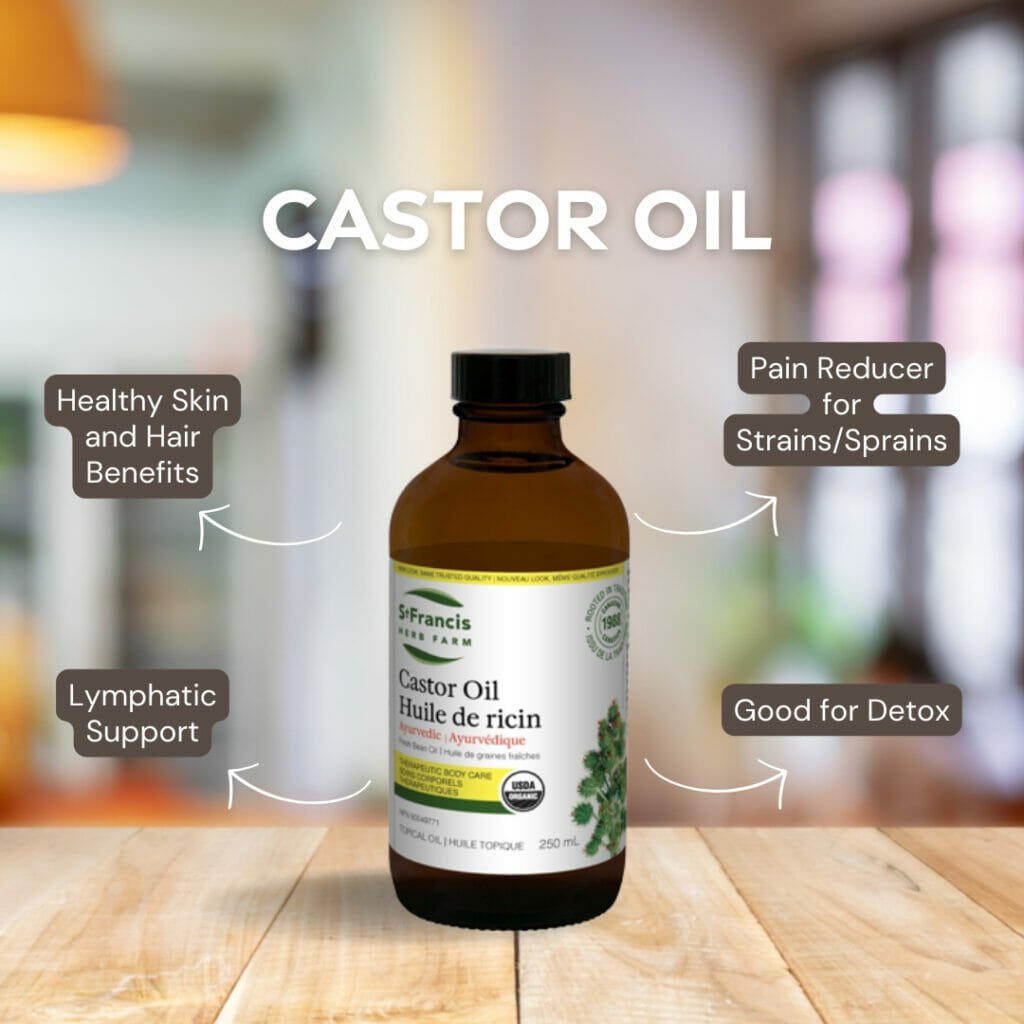
Often when we first suggest a client to look into Castor oil they are worried we are going to tell them to drink it. Fear not! We will be diving into the topical application of castor oil. Castor oil, extracted from the seeds of the castor plant (Ricinus communis), is a natural remedy that has been cherished for centuries due to its potential health and skincare benefits (1). In recent times, its topical application has gained traction, particularly in the context of managing chronic pain and specific ailments like neck pain, headaches, migraines, and back pain. This blog post delves into the properties and applications of castor oil, shedding light on its potential to alleviate discomfort associated with various conditions.
POTENTIAL BENEFITS OF CASTOR OIL
Anti-Inflammatory Properties: Castor oil is rich in ricinoleic acid, which has potent anti-inflammatory effects (1). Inflammation can contribute to the development and growth of cysts, so reducing inflammation with castor oil may alleviate symptoms associated with cysts (2).
Analgesic Properties (Pain Relief): Ricinoleic acid in castor oil exhibits pain-relieving properties. This can be particularly beneficial in alleviating the discomfort associated with cysts (2)
Antimicrobial Properties: Castor oil contains compounds that possess antimicrobial properties, potentially aiding in preventing infections in or around cysts (4).
Moisturizing Properties and Skin Health: Castor oil’s moisturizing properties can soothe dry or irritated skin, which may be particularly beneficial for cysts located in areas prone to dryness or irritation. The fatty acids present in castor oil, including omega-6 and omega-9, deeply nourish the skin, promoting a healthy complexion and supporting skin hydration.
HOW TO USE CASTOR OIL
Castor oil can be utilized topically for its numerous benefits.
WHAT YOU NEED
- Organic Castor oil (ideally should be in a glass bottle)
- Flannel cloth (4 layers of organic cotton flannel)
- Water-resistant barrier: Unbleached parchment paper or plastic wrap, (Castor Oil Pack Holder which can be used for several applications.( You can also use grocery bags.)
- Heat pack ( ideal moist heat such as hot water bottle)
- Bowl
- An old towel, robe, or blanket (You will want to add a protective barrier between your body and where you will be lying (bed, couch, floor, etc.). This will ensure that excess oil is contained, preventing unwanted oil stains.)
HOW TO DO IT
- Place the old towel or blanket where you will be lying down. You will be lying down for up to 45 minutes to an hour.
- Saturate the flannel with castor oil in your bowl. (4 layers of organic cotton flannel)
- Place the flannel cloth over the affected area
- Cover flannel cloth with a water-resistant barrier (cut 1-2″ larger than flannel)
- Place heating pad/hot water bottle over plastic and set on low heat for 45-60mins.
- Wrap the towel/robe/blanket that you are lying on around your body for added warmth and comfort.
- Rest while the pack is in place; careful not to fall asleep with a heating pad on (may burn)
- After removal, cleanse the area with water
- The castor oil pack can be reused
CLEAN-UP & FREQUENCY
- After removing the pack, cleanse the skin with the Castor Clean™ Towelettes or make a solution of 1 tsp. baking soda in 1 pint of water and apply the mixture to your skin with a paper towel. Showering directly after also helps to remove any excess oil left on the skin.
- Apply the pack at least 5 of 7 days
AVOID
- On an open would
- DO NOT USE ON THE ABDOMEN DURING PREGNANCY OR MENSTRUATION*
- Do not use heat over areas of inflammation or when pregnant. Do not use with appendicitis, pancreatitis, ulcers, or any area where the skin feels hot.
- Caution with individuals who have neuropathy, skin sensitivity, chemical sensitivity, or bleeding disorders.
Disclaimer: The provided information is for educational purposes and should not replace professional medical advice. Castor oil, derived from the castor plant’s seeds, has potential benefits, but caution should be exercised. Results may vary based on individual health conditions, lifestyle, and adherence to guidelines. Consult a healthcare professional before using castor oil, especially if you have underlying medical conditions or are on medication.
Castor oil has contraindications and potential risks, including not using it on open wounds, during pregnancy, menstruation, or over inflamed areas. Individuals with specific medical conditions should exercise caution. Scientific research supports some benefits, but further studies are needed to fully comprehend its effects. Seek a healthcare professional’s advice before use. Use of castor oil is at your own risk, and we are not liable for any claims, losses, or damages arising from its use.
References:
Assumpção, E. C., Lima, L. C., Mota, A. P., Souza, E. L., Leal-Cardoso, J. H., & Barbosa, R. (2010). Anti-inflammatory and peripheral antinociceptive effects of the crude extract and fractions from Kalanchoe brasiliensis. Pharmaceutical biology, 48(6), 649-657.
Vieira, C., Evangelista, S., Cirillo, R., Lippi, A., Maggi, C. A., & Manzini, S. (2013). Effect of ricinoleic acid in acute and subchronic experimental models of inflammation. Mediators of inflammation, 2013, 1-12.
Vieira, C., & Marques, C. (2012). Castor oil: properties, uses, and optimization of processing parameters in commercial production. Lipid insights, 5, 1-12.
Vieira, C., Fetzer, S., Sauer, S. K., & Evangelista, S. (2018). Cytotoxicity and antimicrobial activity of ricinoleic acid monoester derivatives. Molecules, 23(2), 339.
